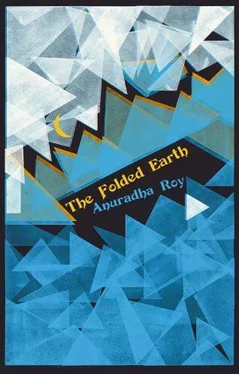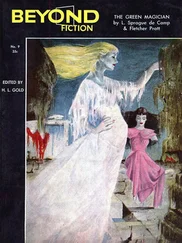Charu, who laughed at these songs before, now hummed them under her breath. It was so cold that the water in buckets left outside grew skins of ice overnight; yet she washed her hair every few days, and I frequently saw her sitting in the yard outside their house, drying it in the milky winter sunlight. It no longer went uncombed till evening. She began to tuck flowers into it: a small pink rose from a wild bush, an iridescent plastic carnation.
One afternoon, there was a cry of pain at our workshop and I ran in to see a chopping board bright red with blood. Orange rinds need sharp knives and Charu and the other girls who had the work of slicing were picked for being dexterous. Accidents were very rare. But this time the knife had gone deep into her ring finger. She was standing there, clutching it, looking dazed. The others had wrapped a dishcloth around the finger and one of them was exclaiming, “She’s in her own world these days, never looks where the knife’s going.” The blood dyed the white cloth red in seconds and by the time we stopped a passing jeep-taxi and got her to the Civil Hospital for stitches, she looked as if she was going to faint. The smell of blood was strong, metallic, and frightening.
The next day Ama insisted Charu stay at home and before she could utter a word of protest, Ama had yelled towards her son, “Enough idling. You take the cattle grazing alone today, Puran. And count them when you bring them back. If there’s one goat or cow missing I’ll smash your head into so many pieces you won’t find one bit of it again.” She shook her walking stick at Puran.
But Charu stole out in the afternoon when her grandmother dozed in a patch of sun near their radish patch, and went down to the Dhobi Ghat. She held up her finger like a trophy and unwrapped the bandage to show Kundan Singh the stitches. As expected, he took the finger into his hands and stroked it around the stitches. And although that tenderest of touches was agony for the swollen finger, she kept herself from wincing so that he would not stop.
Only two months had passed since Kundan Singh had come to Ranikhet, but his presence had become air, water, and food to Charu. She had to see him every day. If he was late she worried, if he left early she sulked. She hid keepsakes from their meetings in the cowshed: a blue and white feather from the long tail of a magpie, a stone from the Dhobi Ghat stream, a bead necklace he had bought her which she could not wear for fear of Ama’s questions. She could think of nothing but him all day and if he had asked her to come to the Dhobi Ghat at midnight to meet him, she would have run down the night-shadowed, leopard-smelling slopes without a thought.
What would happen when Ama and other people found out about them? Charu confided her fears, desires, and hopes only to Gouri Joshi when milking her each morning. With the rest of the world she was as secretive as was possible in a small town where everyone came to know everything, sooner or later.
Our town has two distinct parts. One part is the crowded Sadar Bazaar. In the other part, the cantonment, where the Light House is, most of the estates are at a distance from each other, and stretch for several acres across valleys and streams. The houses were built in the nineteenth century by the British, without architects or building plans. They made enormous stone mansions with chimneys and attics, fireplaces and mantelpieces, but also deep verandas and tin roofs. To the extent that it was possible in distant India, they recreated their remembered Scotland. Ever since, Ranikhet has been made up of memories and stories: of trees laden with peaches the size of tennis balls, of strawberry patches and watercress sandwiches, of the legendary eccentrics who lived here. There was the scholar-dancer who lived alone tended by a village man whom she had taught to recite Hamlet’s soliloquies. In her eighties she employed an impecunious artist to illustrate a book on dance and posed for him day after day in full Bharatnatyam costume, frail and bony, and relentlessly scathing about his ineptitude. He crept out one night, braving the darkness and his fear of wild animals, and escaped her and the town, leaving his sketches behind on his bed as a tidy heap of shredded paper. Then there was Angelina, the Goan visitor who fell in love with our retired General, who was old enough to be her father. He was smitten by her cropped, floppy hair, her careless beauty and her brisk disregard for propriety. They married, and she wandered the town in flamboyant dresses, flowers tucked behind her ear, intercepting tourists and telling them the Forest Lodge had ghouls that drank blood on particular nights.
Our town has a private history that is revealed only to those who live here, by others who have lived here longer. Ama had a daily story for me both about the dead and the living, talking in the same breath of Janaki on the next hill who made bhang and charas out of the marijuana plants that grew wild all over the hillsides, and of unmarried Missis Lily who had fallen pregnant forty years ago by the judge of the local court. When I went to the Christian cemetery, where I had buried Michael’s ashes, I recognised the names on the other tombstones from stories I had been told over the years. In the older part of the graveyard was Charlie Darling beneath a gravestone with winged angels. He had been dead since 1912, of syphilis, I had been told, after too many visits to Lal Kurti, where pretty Kumaoni women earned extra money from soldiers stationed in Ranikhet’s army barracks. The fiery Angelina was a few feet away, beneath a marble slab with carved roses. She never came out of anaesthesia after some minor surgery at the hospital. The General, now in his nineties, had been mourning her for decades. He came to her grave every week with Bozo, and if we met there, he gave me a ride home in his old Ambassador. Bozo would sit very straight in the front, staring solemnly ahead, while I had to make do with a corner in the back that I managed to free of clutter and dog-things. From behind, the big German Shepherd was a head taller than the General who — in his prime no taller than the Army’s mandatory five foot five inches — was shrinking every passing year. He held himself as high as his five remaining feet would allow and as he drove he alternated between humming songs from old Hollywood musicals and holding forth on the anarchy in the country. “It’s going to the dogs,” he would say and immediately apologise to Bozo: “Not you, dear boy, not you. You would rule with an iron paw … “ and in the same breath to me, “June Allyson, my girl, did you ever see June Allyson? No, of course not … too young — ”
These were the people I was telling Veer about one afternoon when he had fallen in step with me, as he often did these days when I was on my way back from the graveyard or when I took the shortcut through the woods and across the stream to the bazaar and St Hilda’s. Once he held out a hand to me on the steep bit in the forest path to the bazaar where tumbling boulders made footholds precarious. I had been so taken aback that I had taken his hand, forgetting that I clambered down those stones all by myself every day.
“But what about you?” I said. “You came here in your childhood, you probably know all this old gossip. Himmat says the house was full of people in those days, and parties. I can’t imagine Diwan Sahib throwing parties. He is such a solitary person.”
“Oh, the old man was very different then. He was very handsome, straight and tall and strong-looking. He had a romantic, heroic aura. People said that once he put his own life at risk to save one of those tribal lion-trackers. That long scar he has all the way down his left cheek? That’s from the mauling he got.”
Читать дальше












